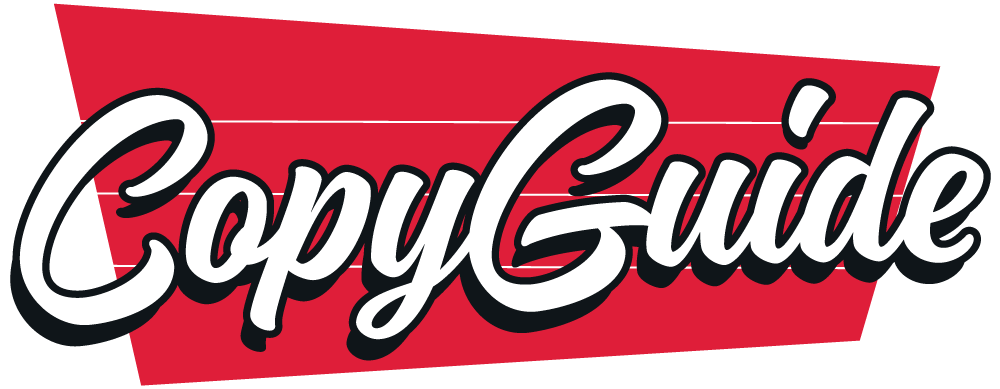The vast majority of small businesses shouldn’t hire a copywriter.
There, I said it. No regrets.
Now, you might be wondering: ‘Hey, aren’t you a copywriter, Dustin? Why are you bashing your own trade? Do you hate money or something?’
No, I love my craft. And I’m a fan of money too ;). But after critiquing web copy for hundreds of different brands — some big, most small — I’ve noticed a discouraging trend…
Small companies and startups will spew effort and money on copywriting that doesn’t do squat for their business.
Sometimes the owner had the wrong expectations (great copy won’t help a bad product).
Sometimes they hired the wrong copywriter.
Other times they needed to better understand their customer or work on their positioning first.
So I often end up in the bizarre position of talking an entrepreneur out of hiring a copywriter. At least, in the short-term.
And chances are — assuming you run a small business or an early-stage startup — you probably shouldn’t hire one either. I’m not the only veteran copywriter who feels this way.
Allow me to explain.
What ‘small business copywriting’ really means
When I say ‘copywriting,’ I’m NOT referring to stuff like:
That’s not copy — it’s content (and to be honest, AI will probably be writing a lot of that stuff in the future anyway).
Copywriting, on the other hand, is designed to encourage a specific audience to take a specific action. Like buying a product or signing up for a newsletter. It’s built on a boatload of strategy, data and expertise.
Copy might be educational. It might be entertaining (the best copy usually is). But ultimately, the role of a copywriter is to craft persuasive arguments using a combination of psychology and customer research. And if it’s done well, conversion-focused copy can multiply your leads and sales — simply by changing the words on a website or in an email!
Don’t believe me? Here’s proof.
Not a lot of small business owners realize the full potential of copy (kudos if you’re in the minority). So often they hire a creative writer to bang out words that sound good instead of crafting copy that will actually resonate with their audience.
So if you just need someone to load up your website with blog articles or to crank out a promotional ebook about best gardening practices, that’s cool and all. Go hire whoever you think will do a kick-ass job.
But if you want email or website copy that actually generates results…well, that’s different. And to make things even more complicated, exactly how your small business should approach copywriting depends on a number of factors like:
( Note: if you’re not bootstrapped and don’t have a limited budget, just invest in a copywriter already — either a one-time project or – even better – on retainer).
So let’s get into how your small business or startup might want to drive into this whole copywriting thing.
Your Business Stage & Model Determines Whether You Hire or DIY it

Different businesses. Different models. Different copy and messaging needs.
Your approach to copywriting should be guided by the fundamentals of how your business works: early stage startups must pivot constantly, tweaking and refining their positioning, while more established businesses can settle into a somewhat more concrete copy strategy.
Which of the following best describes your small business?
Local Business? DIY or ‘wordsmith’ it
Full disclosure: I’ve done zilch copywriting for local companies. But I know that these businesses often rely on word-of-mouth from a comparatively small market. And while having clear, compelling copy is important it’s unlikely that Bob’s Pizzeria in Springfield is going to see an ROI on that $10,000 investment in new website copy.
In this case, it’s better to hire a ‘wordsmith’ or just have Bob write it himself. Hiring a $150/hour direct response copywriter won’t deliver a return on that investment anytime soon. The exception might be if Bob made a strategic decision to stand out with a sticky brand and ad campaign — but that’s really more of an overall marketing or branding decision versus just a copy one alone.
Early stage startup? Keep it in-house for now
But this really depends on your budget. I typically recommend that startups either have someone on their team who can write copy or put a copywriter on retainer. Why? The need for constant iteration.
It takes testing, learning and loads of iterating to figure out how to position an early stage startup. You won’t get it ‘right’ immediately. So shelling out big bucks for a one-time website or email copywriting project doesn’t make sense — you could be revising the thing in six months anyway.
Review, refine, and update your website and other collateral as you learn.
Pre-revenue? DIY for sho
Now if you have some moola coming in from investors or a dead uncle, by all means drop a heap of cash on copywriting. Otherwise, do your market research and talk to your ideal customers. Gain as much understanding as you can about their pain points and write your copy in-house using those insights.
It won’t be perfect. Shit, it may not even be that good. But it gives you a starting point to collect some baseline data on how it performs. Then you can improve and iterate as you do bring customers on. And then eventually, yes, you should hire a copywriter to help out.
Established small online business? Hmmmmmm
Okay, now things are getting tricky. I see the answer coming down to a few important questions:
Do you have more time than money?
If the answer is yes, then it might make more financial sense to write your own copy. You’ll gain some valuable business skills (see below) and will probably end up with better results anyway than if you hired a budget scribe.
Do you know what kind of ROI to expect?
This comes down to your business model. Let’s say you’re selling a $1000 info product and you typically sell 30 units per month. If a new expertly- written sales page generates an extra 10% in sales that’s an extra $3000 per month — definitely worth hiring a rockstar copywriter to get that result.
Buuuuut if you’re a struggling ecomm store that needs new product descriptions, the math may not add up so well for you. And writing the copy yourself may make more sense.
3 More Reasons To Consider Writing It Yourself
Maybe your small business doesn’t fall into one of the buckets I described above.
Or maybe you think copywriting is too hard/boring to learn.
Fair enough. But there are a few other benefits from gaining basic skills in the art and science of craft conversion copy:
1
You’ll gain a valuable business skills
Sure, learning the basics of copywriting takes some time. But that time will help you develop better communication and persuasion skills that’ll aid your business overall. You’ll better understand how to explain what makes your company uniquely valuable to others, which can help you pitch investors or build strategic partnerships. Delivering a crisp elevator pitch makes you sound like the savvy, confident business leader folks want to work with.
Plus, you’ll know when it’s time to update your messaging. Let’s say some new products go online, your positioning pivots or your brand gets a major upgrade — these are all reasons you might need to adjust your copy. And if you write it all yourself, you’ll be best-equipped to make tweaks yourself or direct a copywriter to do this.
2
You’ll have more money for other marketing
Expect to pay $50 to $150/hour for a trained conversion copywriter (depending on their experience level). More experienced scribes (like moi) command even higher rates. That’s a lot of moola.
And if your small business has a small marketing budget, it may not make sense to spend $10,000 on a website rewrite. You still need to buy ads, hire a designer or even pay a blogger if you’re putting a content marketing plan in action.
Now, you might be tempted to hire a less experienced copywriter for under $50/hour to write for you — but that’s risky. You could end up with a ‘wordsmith’ who writes purdy lines but knows nothing about consumer psychology, product positioning or general storytelling strategies. So your copy could actually end up sounding like poetry…but selling like crap.
3
You probably know your customer best
Think about it. You’ve built your business by understanding what your customer wants and needs — that’s essential for writing effective copy. And just telling a copywriter what you know isn’t enough: they’ll need to talk to your customers, look at your competitors’ messaging and maybe even do a survey. You’ll likely still need to do extra research if you write your own copy, but you’ll be lightyears ahead of anyone coming into your biz cold.
3 DIY Copywriting Options
Okay, so you’ve determined that hiring a copywriter may not be the right choice juuuuust yet. Your positioning is gonna change, your marketing budget is teeny or you’d just like to gain some persuasive skills. Cool, but I’ve got good news and bad news for ya:
The bad news: Copywriting takes years of studying and practice to do well.
The good news: You don’t have to become a copywriter. You just need to know how to write copy for YOUR business.
Having an in-depth understanding of your audience — this is where research is unskippable — and having some basic copywriting chops will put you lightyears ahead of the budget copywriters who won’t do the digging required for big results.
Here are three DIY copywriting options to consider:
1
Learn just enough to be dangerous
There are exactly 36,839 ways to learn copywriting online.
(Okay, I made that number up. But it’s probably not too far off.)
Copywriting courses are tempting, but I think the vast majority of them are ….meh. They’re often overpriced and regurgitate the same advice you could find from an evening spent on Google. Instead, whoever handles your business’ marketing (maybe you, solopreneur) should educate themselves like this:
And then apply what you learn to your business, always keeping your customer top of mind. I did mention the value of research, right?
Now, I know not everyone has time for this. So there are some faster options…
2
Get guidance from an experienced copywriter
Feedback from an actual expert is much better than staring at the screen and wondering: “What the $%&* have I gotten myself into?”
Sure, it can be a tad pricey (I charge $200/hour, for example). But even 30 minutes of feedback can help you catch mistakes that’ll tank your conversions. Two options to consider:
3
Or a combination of both
Okay, now we’re REALLY cookin’.
I’m clearly biased, but I think this is the ultimate way for small businesses and bootstrapped startups to craft lucrative copy — without rolling the dice on an unproven copywriter or investing months learning the craft. It’s simple:
- 1Fire up a step-by-step CopyGuide that walks you through the entire copywriting process. Unlike 95% of the courses out there, you’ll be actually writing the copy you need as you learn. Two birds…
- 2If you have a question or need a dollop of advice, hire a seasoned pro for a bit of quick help (yes, I’m the pro in this case :).
- 3Smile approvingly at the copy you wrote, knowing it’s been vetted by an expert and will be most likely to resonate with your dream customers.
But again, I’m biased.
3 Mistakes To Avoid When Hiring A Small Business Copywriter

Okay, fine. You’ve determined you’re gonna hire a copywriter. I won’t convince you otherwise, but I will give you some advice based on a decade of experience.
Remember: if you don’t hire someone competent, you’ll be actually paying for words that might chase away your best-fit customers. I’ve seen it happen! So keep these three red flags in mind:
1
They can’t demonstrate any results
Effective copywriting is measurable. Even if their copy hasn’t been A/B tested (most small businesses can’t do this anyway), the copywriter should still be able to demonstrate that they’re more than a wordsmith.
Did they write an email that generated sales?
Or a landing page that hauled in demos?
Or website copy that reduced bounce rate?
If not, you risk hiring someone who doesn’t actually know their stuff.
2
They don’t have experience in your space
You don’t necessarily need to hire someone who knows every intimate details about your highly specific niche (what? No copywriters specializing in imported Norwegian vodka?). But they should have some experience in your general space:
If they’re 100% new to what your business sells, they’ll need to get up to speed on the competitive landscape and expectations from the buying experience. They won’t know what tactics are played out in your industry and what approaches are fresh and original.
Not to mention, you’ll be dealing with a pretty big learning curve when it comes to onboarding them.
3
They don’t charge much
“Wow, what a deal!”
That’s a phrase you should never say about your copywriter.
You should expect to pay between $100 to $200+/hour for a conversion copywriter that delivers results. It’s tempting to hop on a site like Upwork and hire someone on the cheap, but you risk hiring someone who doesn’t know how to generate results (which is why #1 is so important).
Good copywriters are expensive for a reason.
(sidenote: I just realized this article has three lists of three items. Ooooooh, freaky 😉
If you still can’t make up your mind…
Maybe you didn’t think this would be such a complicated decision.
You thought you’d just type ‘small business copywriter’ into Google and find a happy scribe to write stuff for ya. Sorry to complicate things. But copywriting and messaging is crazy important — it has the power to generate mega-results for your brand!
But since I made life a tad more difficult for you, it’s only fair I try to fix it. If you have any questions about this stuff, feel free to contact me and I’ll do my best to point you in the right direction.
Honestly, I’m just happy to see you taking copywriting seriously — a lot of small businesses don’t. And that’s one heck of a missed opportunity.
